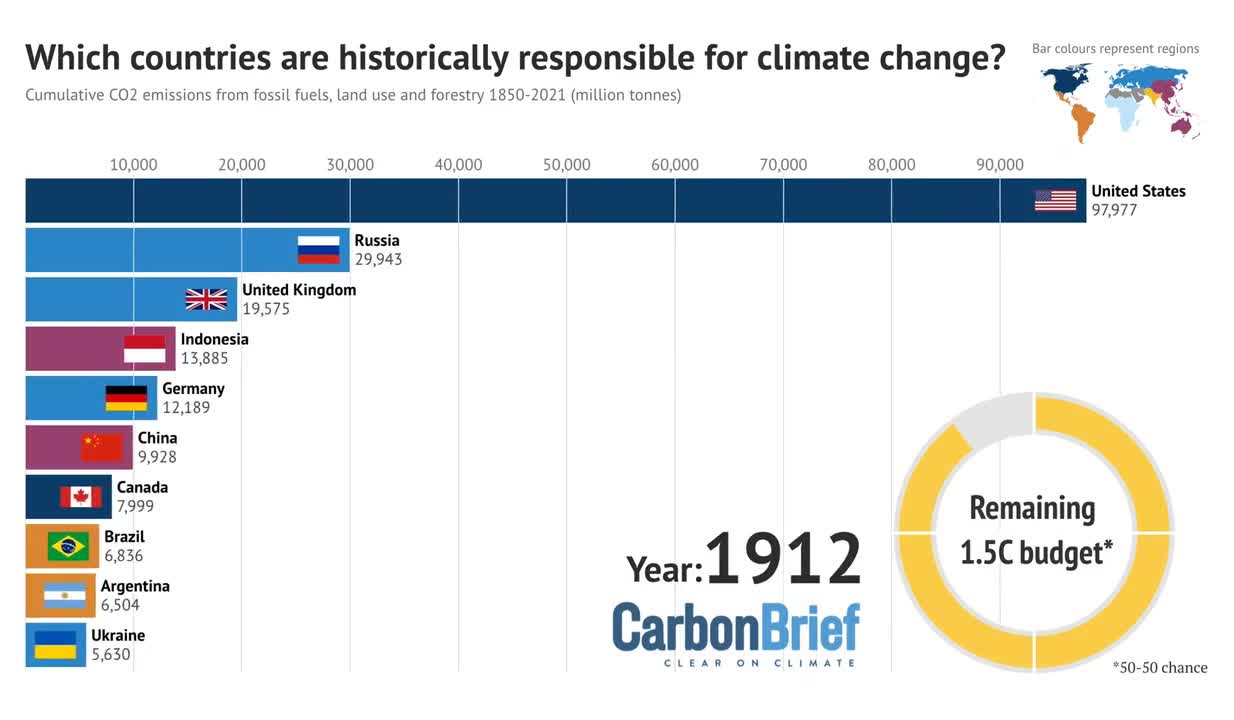Premium Only Content

Which countries are historically responsible for climate change?
Analysis: Which countries are historically responsible for climate change?
https://www.carbonbrief.org/analysis-...
Animation shows, by ranked nation, cumulative CO2 emissions from fossil fuels, land use and forestry, 1850-2021 (million tonnes). Bottom right, remaining carbon budget to limit global warming at 1.5C (50-50 chance). Analysis by Simon Evans. Animation by Tom Prater for Carbon Brief.
---
Historical responsibility for climate change is at the heart of debates over climate justice.
History matters because the cumulative amount of carbon dioxide (CO2) emitted since the start of the industrial revolution is closely tied to the 1.2C of warming that has already occurred.
In total, humans have pumped around 2,500bn tonnes of CO2 (GtCO2) into the atmosphere since 1850, leaving less than 500GtCO2 of remaining carbon budget to stay below 1.5C of warming.
This means that, by the end of 2021, the world will collectively have burned through 86% of the carbon budget for a 50-50 probability of staying below 1.5C, or 89% of the budget for a two-thirds likelihood.
The analysis includes CO2 emissions from land use and forestry, in addition to those from fossil fuels. In first place on the rankings, the US has released more than 509GtCO2 since 1850 and is responsible for the largest share of historical emissions, Carbon Brief analysis shows, with some 20% of the global total.
China is a relatively distant second, with 11%, followed by Russia (7%), Brazil (5%) and Indonesia (4%). The latter pair are among the top 10 largest historical emitters, due to CO2 from their land.
Meanwhile, large post-colonial European nations, such as Germany and the UK, account for 4% and 3% of the global total, respectively, not including overseas emissions under colonial rule.
Read the full article and methodology via the link: https://www.carbonbrief.org/analysis-...
Our Creative Commons license: you are welcome to reproduce original material unadapted in full for non-commercial use, credited ‘Carbon Brief’ with a link to the original article. Please contact us for commercial use.
-
 1:02:30
1:02:30
Exploring With Nug
10 hours ago $0.83 earned2 Duck Hunters Missing After Kayak Capsizes!
15.1K -
 46:48
46:48
Mally_Mouse
4 hours agoLet's Hang!! -- Opening Christmas gifts from YOU!
36.2K -
 44:55
44:55
Athlete & Artist Show
20 days ago $1.69 earnedNHL 4 Nations Snubs, Was Hawk Tuah Coin A Scam?
41.2K -
 33:47
33:47
Stephen Gardner
9 hours ago🔥Pentagon Whistleblower UNLEASHES on Biden and Obama!
96.9K146 -
 2:20:30
2:20:30
The Dilley Show
10 hours ago $25.10 earnedRoger Stone in Studio plus Q&A Friday! w/Author Brenden Dilley 12/27/2024
81.9K16 -
 1:57:02
1:57:02
The Charlie Kirk Show
9 hours agoThe Great H-1B Battle + AMA | Lomez | 12.27.24
163K215 -
 11:39
11:39
Russell Brand
1 day agoWhat You're Not Being Told About The Syrian War
167K244 -
 DVR
DVR
Bannons War Room
1 year agoWarRoom Live
101M -
 1:49:21
1:49:21
Film Threat
12 hours agoBEST AND WORST OF 2024 + SQUID GAME SEASON 2 | Film Threat Livecast
60.7K6 -
 1:06:04
1:06:04
The Big Mig™
1 day agoGlobal Finance Forum Powered By Genesis Gold Group
50.5K2